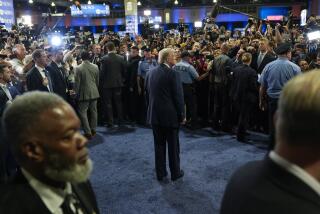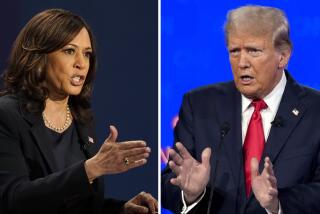GOP Fears Fallout on Bush Ad Jeering Gore on Debates
- Share via
George W. Bush on Wednesday launched television commercials slamming Al Gore for refusing to sign onto a Bush-proposed series of debates, further focusing the presidential race on an issue that some in Bush’s own party fear may come back to haunt him.
The steady escalation over a topic that rarely matters to voters has overshadowed Bush’s policy pronouncements for several days, diverting attention and time from a campaign whose lagging poll numbers have prompted increased nervousness among Republicans.
“Worried, verging on panic” was the mood in GOP circles, according to William Kristol, former chief of staff to Vice President Dan Quayle. “It’s been a big deterioration pretty fast.”
Democratic nominee Gore on Wednesday held to his position that he would entertain other joint appearances only after Bush agreed to attend the three October meetings organized by the nonpartisan Commission on Presidential Debates. The commission has sponsored such gatherings since the 1988 campaign.
Even as Bush began airing the ad challenging Gore to joint appearances on CNN and NBC, the Texas governor’s position weakened dramatically. Both networks announced that they would cancel the sessions unless both Bush and Gore show up. That meant that Bush would be denied the visual opportunity to make his case against an empty chair.
Some Republicans deplored the campaign’s focus on debate logistics, saying that it buried Bush’s issue message and risked raising the stakes for Bush if it turns out that the two candidates agree to only a minimal number of sessions.
“All you have in a campaign are time and money,” said strategist John Weaver, who worked for Bush’s competitor Sen. John McCain during the primary season. “Both are being used in a debate about debates and there may be a time in October when you look back and say, ‘I wish we hadn’t spent a week’s worth of advertising or time talking about this.’ ”
GOP Strategists Worry Over Momentum Loss
Other Republican strategists--most of whom insisted on anonymity to preserve their relations with Bush--said the debate over debates was another sign that the campaign has lost some of its momentum and focus. There were other signs as well: The subjects of the campaign’s ads and the candidate’s words are not meshing, and Bush’s long-standing pledges of civility were replaced by increasing hostility on the stump.
But others believed Bush’s moves were dictated by an assumption that victory increasingly depends on disparaging Gore’s character. By painting Gore as untrustworthy--the message of the new ad--Bush hopes to win back the voters who have defected in the last several weeks, they said.
“He’s got to turn this issue into a referendum on Gore,” said G. Terry Madonna, a political analyst at Millersville University in Lancaster, Penn. “These guys have made a very important calculated decision.”
At the close of the fourth debate-debating day, it was uncertain whether the candidates would appear anywhere together, although at least one meeting was possible. Gore agreed to the three commission debates, scheduled for Oct. 3, 11 and 17. Bush on Sunday proposed a meeting Tuesday on a prime-time version of NBC’s “Meet the Press,” an Oct. 3 edition of CNN’s “Larry King Live” and a 90-minute session on Oct. 17 in St. Louis, as scheduled by the commission.
Bush, speaking on Wednesday’s “Today” show, seemed to rule out any debates other than the ones he proposed. “I’m saying these are the three debates I’ll do,” he told host Matt Lauer.
Bush spoke before NBC and CNN made clear that they would not host Bush without Gore.
“The offer of a debate has always been contingent upon acceptance by both candidates,” said NBC News spokeswoman Barbara Levin.
“We are not going to put one candidate on without the other,” CNN said in a statement.
For days, the Gore and Bush camps have been casting the debate argument in broader terms. According to the Gore team, Bush was bent on the 60-minute CNN and NBC debates because he wanted a shorter, less publicized session. (The other networks had pledged not to carry their competitors’ shows.) The Bush campaign insisted that Gore was breaking his vow to debate the Republican “anytime, anyplace, anywhere.”
Although Gore had regularly stipulated that additional debates hinged on the three commission sessions, the ad cites two occasions when Gore assented to debates on the two programs. In neither case did he mention the stipulation.
“If we can’t trust Al Gore on debates, why should we trust him on anything?” the ad asked.
The Bush campaign would not say how much money it would spend on the ad, which was airing alongside other Bush ads on education and prescription drugs. It also would not say in how many states it was airing.
In many of the most contested states, primarily in the upper Midwest, it is likely to dovetail with another ad doubting Gore’s honesty. That ad was paid for by the Republican National Committee but approved by the Bush campaign.
Lack of Rationale to Spurn Debates Cited
Some of the GOP hand-wringing over the Bush campaign’s course derived from Bush’s inability to come up with a logical rationale for spurning the commission debates. The commission was set in place to end candidate disputes over debates.
Asked Wednesday why Bush favored the two joint appearances over two of the commission debates, his spokesman Ari Fleischer said Bush “just thought it’d be informative to have a wide variety of formats and he also thought it’d be the simplest way to get the debates started.”
The Gore campaign countered that Bush is ducking debates that hold the promise of a larger audience. That characterization was not the only danger for Bush, Republicans said Wednesday. By running ads about the debate challenge and limiting the debates, some argued, Bush was increasing the chance that a simple gaffe could ruin his campaign.
“The Bush people have played into the Gore campaign’s hands,” said one veteran of GOP presidential politics. “They’ve raised the stakes of the debate by doing this. If you want a debate that no one pays attention to, have 100 of them. They’re doing the opposite.”
Some said the suggestion that Bush wants to limit the extent and audience reach of his debates with Gore, who is regarded as a potent debater, is also threatening.
“Looking as if you’re worried about debating hurts you in some vague and general way with voters,” said Kristol.
“The debate over debates creates a certain aura, positive or negative, about a candidate, especially in terms of timidity and leadership and confidence. Bush is losing the debate over debates.”
Some Republicans argued, however, that Bush’s best weapon is the matter of character.
“The longer they have a debate about character, the better it is for Bush,” said Kieran Mahoney, a New York-based political strategist.
Much of the fallout will be determined by whether the debate dispute is resolved quickly, before it enters the minds of voters--some of whom are only now tuning into the campaign. Strategists and analysts suggest that voters do not particularly care about the debate details about which candidates obsess--the lectern height, the seconds allotted for rebuttal. But they do expect candidates to embrace a device that allows the public to make its own assessment of them.
“If Bush is perceived as the candidate who is stymieing the process . . . then I do think there could be some political downside to it,” said Madonna, the Millersville University analyst.
*
Times staff writers Edwin Chen, Michael Finnegan, James Gerstenzang, Megan Garvey, Matea Gold, Elizabeth Jensen and Jeff Leeds contributed to this story.
* AMERICAN ROOTS
Its enterprising spirit helps make Bush’s Texas hometown emblematic of the nation. E1
More to Read
Get the L.A. Times Politics newsletter
Deeply reported insights into legislation, politics and policy from Sacramento, Washington and beyond. In your inbox twice per week.
You may occasionally receive promotional content from the Los Angeles Times.









